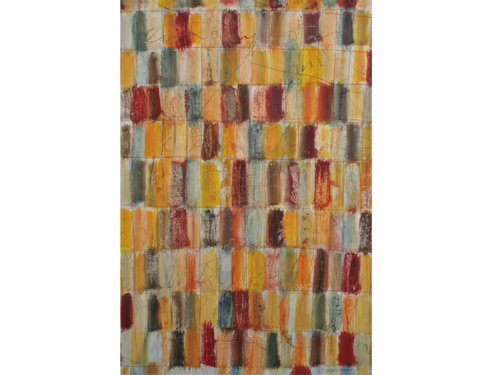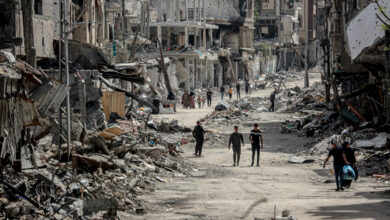
In her debut novel, British-Palestinian author Selma Dabbagh has set herself a very difficult task. “Out of It,” published by Bloomsbury UK, is a realist work that aims to portray life in Gaza justly and honestly. But the novel also works hard to be a fun and widely accessible read.
Dabbagh’s portrayal of Gaza is, in some ways, not so different from the gaping wound that Palestinian poet Mahmoud Darwish presents in his “Journal of an Ordinary Grief.” In Darwish’s 1973 prose-poetic work, he writes, “Gaza has not mastered the orator’s art. Gaza does not have a throat. The pores of her skin speak in sweat, blood and fire.”
In Dabbagh’s “Out of It,” Gaza also struggles to articulate its vision, and speaks in sweat, blood and fire. The landscape is broken down, muddy, concrete and ugly. But Dabbagh’s novel is not just a raw depiction of pain and struggle, legless men and powerless committees. It also has central characters that are appealing, savvy young people who smoke pot, have sex, crack jokes, doubt themselves and hurtle through the novel’s fast-paced action.
“Out of It” is thus a Gaza story that’s situated — either by chance or design — to attract the sympathy of a broad section of the English-reading public. The two main characters, twin siblings Rashid and Iman, are native Palestinians. But they are also outsider-insiders who have lived much of their lives abroad. As such, they are poised to “translate” Gaza for a culturally Western audience.
Rashid and Iman are largely trapped inside Gaza, but they are also children of Palestine’s “Outside Leadership.” The novel’s action takes Rashid and Iman to England, and both have relationships with Brits. The siblings are easy for a British public to relate to because neither is particularly religious. And, while Iman is passionate about her country, she doesn’t have a formulaic political vision. Both sister and brother are feeling their way through the landscape, trying somehow to find their role and their happiness.
“Out of It” thus opens itself easily to the non-Palestinian reader. But, at times, the book’s accessibility and honesty are muddled by its rapid pace. The action moves so briskly that it’s difficult to follow the major shifts in characters’ behaviors and motives. Early on, Iman briefly decides to go on a suicide mission, spurred by the sight of loved ones’ charred bodies. But the action moves so quickly — she dashes in and out of the hospital; she spends a few moments with the family; she plunges into her decision — that the reader doesn’t get the full emotional impact.
The same is true of the book’s ending. Here, Rashid makes a decision that should be a reflection of his growth and change over the course of the novel. But the book’s action moves so fast that it’s difficult for the reader to grasp this seemingly uncharacteristic step.
Indeed, although the book is written in English, Dabbagh’s work still must translate a number of socio-cultural concepts. Anglo readers have a particular understanding of terms like “suicide bomber,” “martyr” and “collaborator” that Dabbagh needs to complicate if her novel is to succeed. Why would a smart, secular young woman agree to a suicide mission? Why might she feel that it’s okay to kill a collaborator?
The writer must get us to re-see these words, to shake up their associations, to re-translate them into a different English. At moments, she succeeds. But at times the engaging, rapid pace of “Out of It” works at cross-purposes with its ability to shade in sympathetic characters and new understandings. Ultimately, the most sensitive moments don’t get enough attention.
The best part of Dabbagh’s debut novel are the social, political and sexual relationships between Palestinians and Brits, particularly between Rashid and his annoying pro-Palestinian girlfriend. In one scene in the middle of the novel, Rashid’s girlfriend Lisa is deeply disappointed in him. She finds that, instead of being imprisoned in London for political reasons, Rashid is in jail for possessing a little hash.
He responds: “‘You’re disappointed, is that it? Disappointed? What is it that you wanted me to do, exactly?’ Rashid started with not a small amount of malice in his voice. ‘Blow up Buckingham Palace? Would that get your attention?’”
Egyptian author Ahdaf Soueif has promoted this novel as a “new and welcome take on the Palestinian story.” Indeed, this is a different sort of Palestinian story: engaging, fast-paced, funny and often fun. Ultimately, Dabbagh does not sufficiently shift the lens through which English-language readers understand Palestine. But it’s a start.




